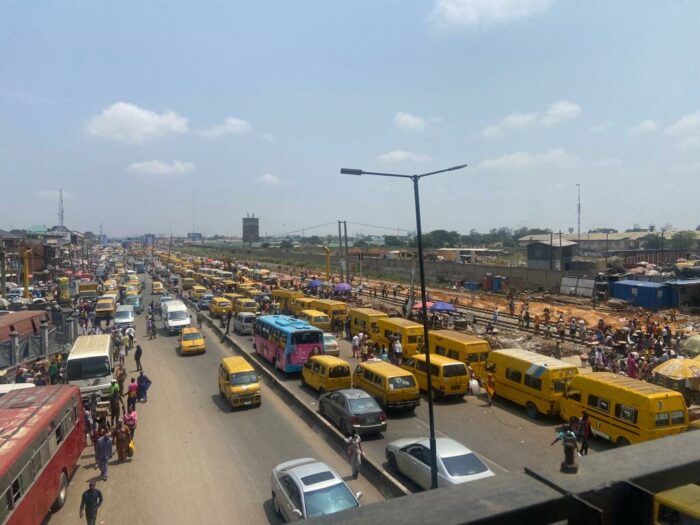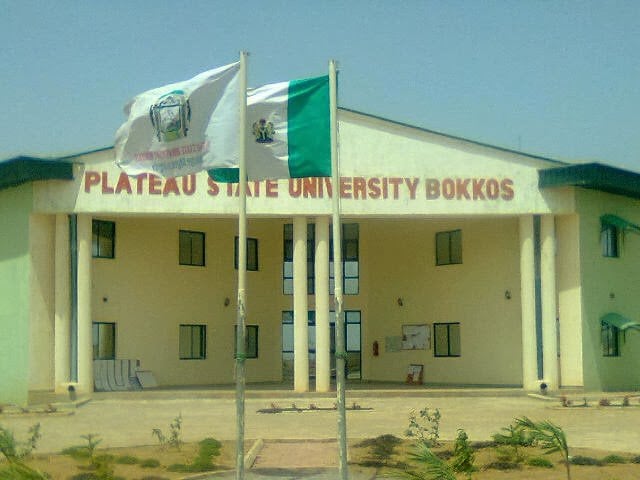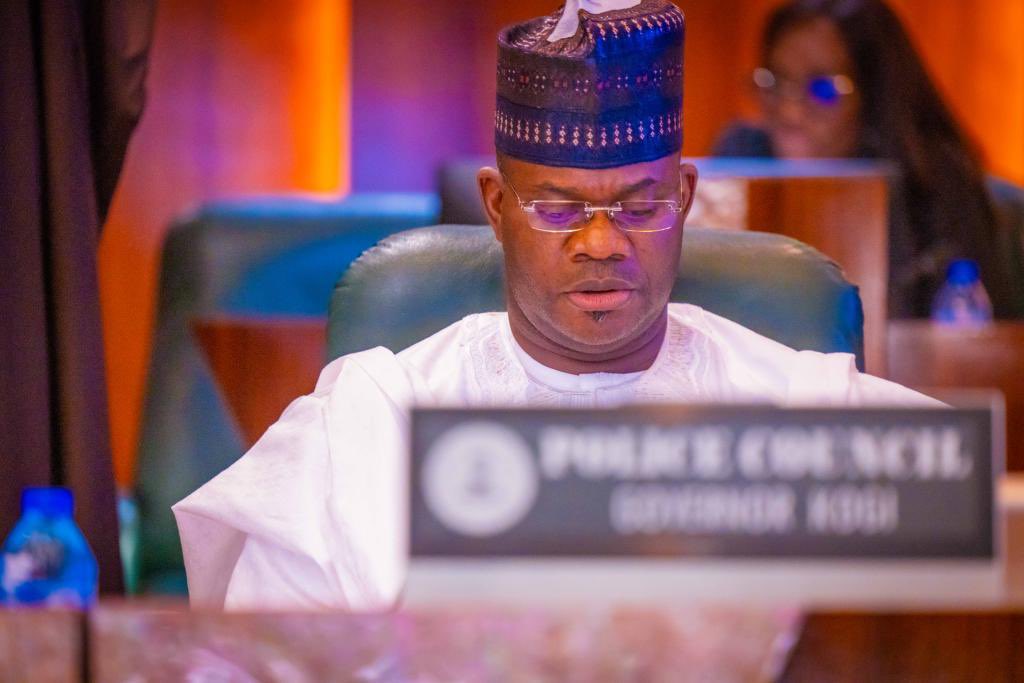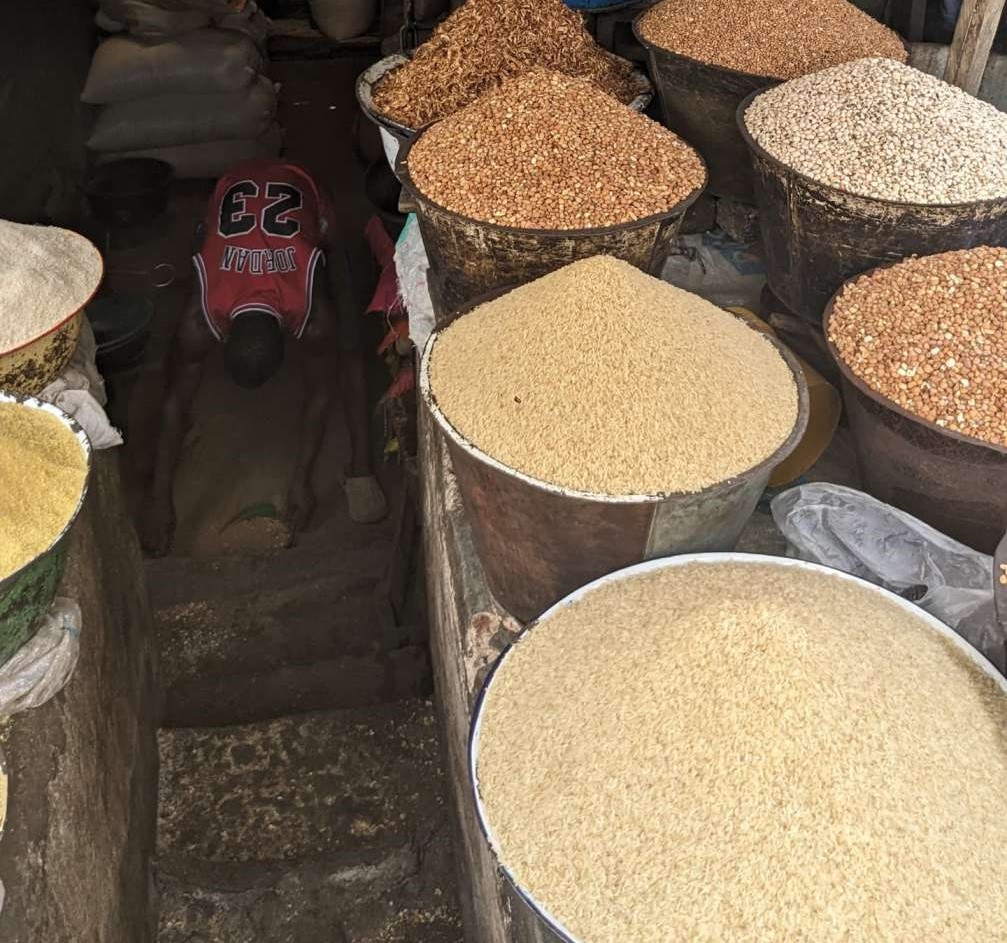When Saheed Osupa sang ‘the boss, chairman, resides in Oshodi,’ (loosely translated to English), he obviously understood the under workings that govern one of the biggest hub of commercial activities in Lagos. As Lagos is home to no one man, so is Oshodi to no one business. The town brims with every enterprise you can think of, from the biggest cloth dealers to jewellery, grocery and transportation businesses. Oshodi is home to all and home for all. One of the most peculiar sights a Lagos newbie won’t miss out is the sea of Danfo buses that line the bus stops. They are everywhere, crawling at snail speed or racing fast with a cheetah’s strength. Behind the wheels of these buses are angry men who hurl curses at will, who are fearless, daring, ferocious and audacious. They would dare the devil to his face at any cost and live life spun on rules made by them. However, these Danfo drivers fear one group: the agberos.
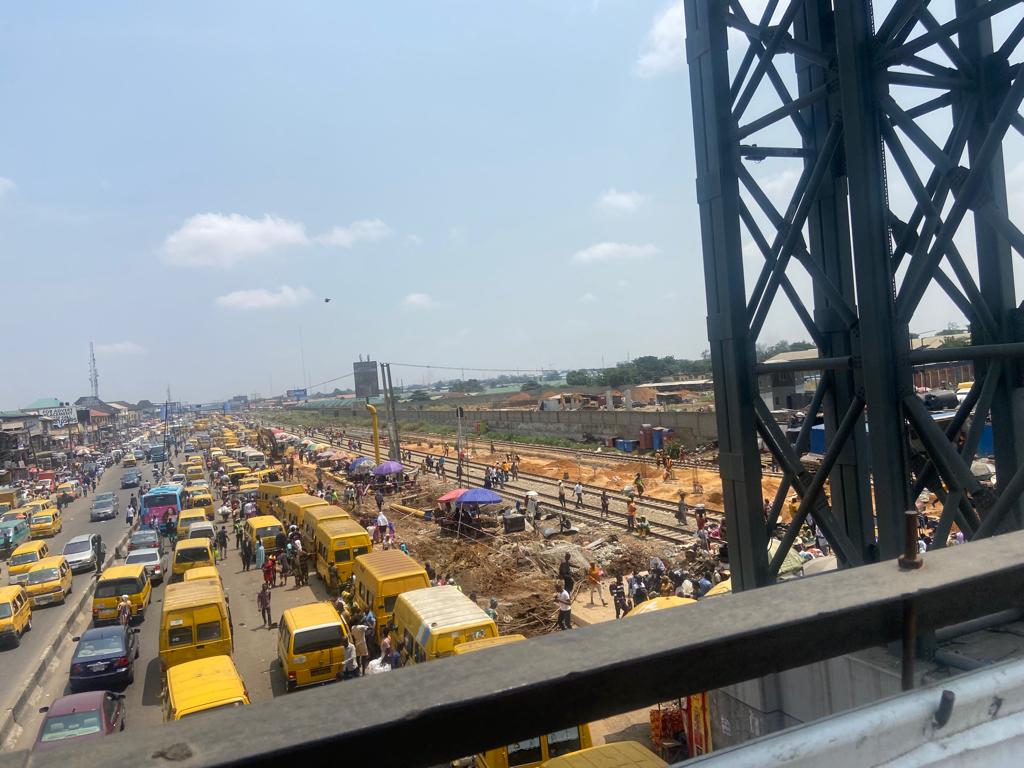
the boss, chairman, resides in Oshodi
In Lagos, agberos are bus drivers’ nightmare. They man nearly every bus stop, where they collect money, claiming it is their right. If any driver refuses to pay, it is at the peril of his bus and sometimes his life, because violence comes easy to them.
Omolabake Ohu and I are in Oshodi to speak with bus drivers on how they survive the ordeal of agberos. They are a real menace, one that bus drivers are scared to speak about or against. They are scared, these drivers, of their fate should the agberos and the National Union of Road Transport Workers (NURTW) find out they are talking to the media.
Saheed Ojo and Tayo Ajegunle (not real names) speak anyway. Ojo has a plate of bread and beans in front of him and resignation in his voice. He and Ajegunle, his conductor, share stories of how the agberos extort them heavily and all they get to take home after a long day of work is N2,000 or less.
Every day, from dusk till dawn, they both transport passengers to and from Oshodi and Tollgate. They make four trips in a day and close from work late in the night, but the agberos earn more than they do.
If they must remain in business, they have to pay their dues to the owners of the park. It’s either you pay or you go home with serious damages to your vehicle.
“From Oshodi to Tollgate, we charge a passenger N300. We carry an average of 21 passengers, and that’s N6,300 altogether. But once we are set to move, we are mandated to pay N2,200 to the agberos for each loading,” Ojo says.
“You forgot to add that what we pay is only valid within the park; the moment we step out, it’s continuous billing,” Ajegunle adds.
“At Iyana-Ipaja, we have to pay another N1,800 to the agberos who put illegible marker signatures on our windscreen in return.”
Ojo scratches his head. “It is very exhausting because we fuel our bus with diesel, and not petrol. A litre of diesel is N780 and we need 13 litres each day. That’s N10,140 each day. It’s tiring and we are almost helpless.”
“What’s more annoying is that these signatures are only valid for three hours.”
He touches one of the signatures in red ink and said, “All these signatures are only valid till noon. They have to be renewed anything from 12 pm. You will hear them say “Owo osan da? Owo irole da?”
Ajegunle, the conductor, points at a distance ahead and says, “Look at that junction, if I must pass through there, I must be ready to part with N1,500 whether I am carrying passengers or not. The agberos would call it money for booking and I must pay because I am a commercial driver.”
“They will say you must pay them because you are in their space and came to their garage to load and so you have to pay for using their space.
“No one knows whether these taxes are remitted, but the way it is, anyone can tax you for loading in their park. It’s more like an individual thing.”
The consequences of not paying can be devastating. A bus can get permanent damages. It becomes more worrisome because most drivers get their buses on hire purchase or make daily delivery to owners. Ojo and Ajegunle say their bus was given to them on delivery and that they have to remit N10,000 daily to the owner.
“Apart from what we pay to the agberos daily, we also have to pay N10,000 for delivery. A new bus costs about N4 million and the owner would be expecting money daily,” says Ajegunle.
“You have to ensure you have enough to remit so you will be able to use the bus the next day.
“If you don’t pay the agberos, they can remove your door, spoil the vehicle or just do something that will cause you pain. This will inadvertently annoy the owner. So, to avoid troubles, we just pay them.
“The person who gave us this bus in December 2021 was only trying to help us, and presenting a damaged bus to the person over an Abero rift that can be prevented won’t be a good thing.
“If you were the bus owner, you wouldn’t want to see scratches or anything on your bus.
“So we have to constantly pay the agberos to avoid ugly incidents.”
HOW MUCH A DAY?
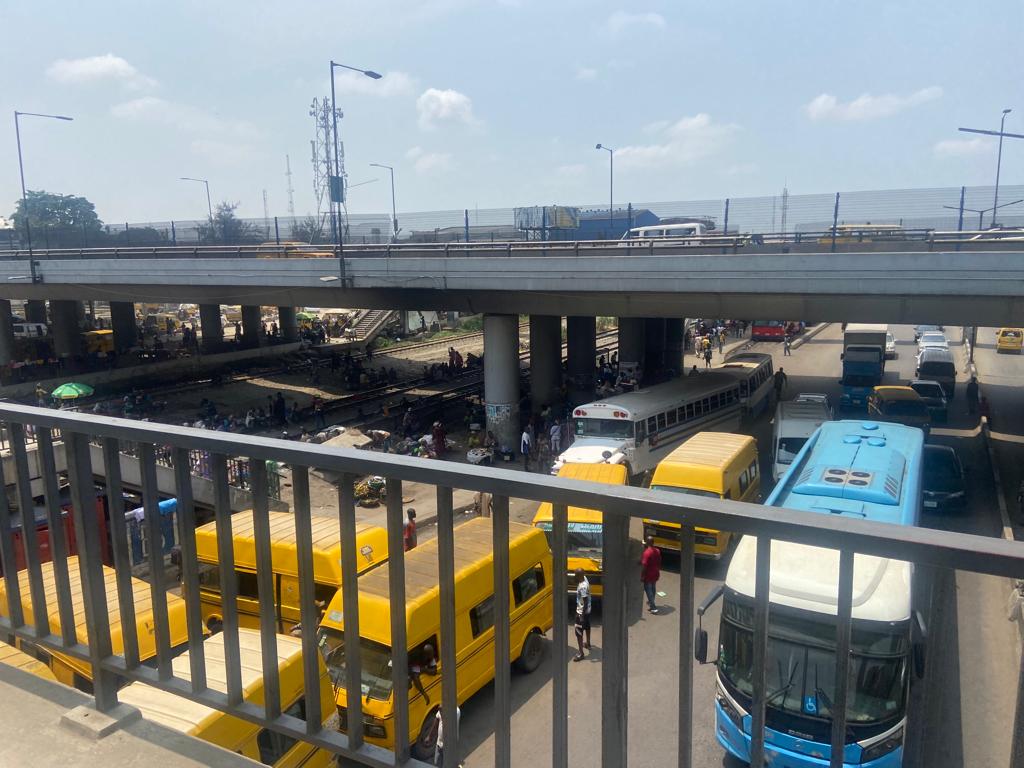
even if you neva carry any passenger since morning, e no concern them
Ajegunle laments how much he and Ojo have to pay to agberos in a day.
“After each loading, the agberos will collect N2,200 out of the N6,300 we will be collecting from passengers,” he says.
“Afterwards, we will pay N1,800 at Iyana-Ipaja, another N1,500 in Agbado and another N1,500 at Tollgate again.”
For each loading, the agberos will earn N2,200 for hanging around in parks and garages. Every eight hours, the agberos who hang around at Iyana-Ipaja would make N5,400 just for putting illegible signatures on buses.
Those in Agbado and Tollgate would make N1,500 multiplied by eight, which is N12,000 daily.
READ ALSO: REPORTER’S DIARY: A Visit to the Other Side of Lagos, Where Alcohol Is ‘Ribena’ to Kids
DRIVERS REFUSE TO SPEAK
Apart from Ojo and Ajegunle, we approach about four bus drivers who decline speaking with us.
My colleague and I approach an elderly man who has white hair resting on his head. He has a slim stature and speaks with literacy sprinkled with trepidation. At the park where we meet him, a conductor calls, “Ifo, Ifo, Ifo.”
“Good morning, sir,” we greet the elderly man. “Do you own this bus?”
“Yes, what do you want?”
“We would like to understand how you deal with extortion from agberos.”
He doesn’t allow us to finish when he shooes us. “We have been warned against speaking with anyone about the park. This warning is from the NURTW leaders who are in charge of the park,” he says.
“I can’t give you the information you need, just talk to our leaders, please.”
He directs us to someone he says is an official in the park. The official also declines to speak to us. He says he’d rather we met the chairman.
We move further and approach Lanre (not real name), another middle-aged driver. His hesitation becomes evident the moment we introduce ourselves. He expresses fears that our investigation may ruin him.
“See, I can’t say anything. These questions would require that I reveal what nobody wants you to find out,” he says.
“Speaking to you would make me and my business vulnerable to all kinds of attacks from these people. I would become a target and get threats from them.
“I don’t want any problem for my life. I am not an NURTW member or official, and I don’t want to talk about this because it will require that I unravel the secrets of politicians, and if you must do that, you should be ready to pay the price.
Another elderly man, Wasiu (not real name), declines to say anything.
“I can’t answer your questions. They are really difficult ones. Our leaders do not permit us to talk to strangers about our business. They might even be watching as we are conversing right now and later come to find out what we are talking about,” he says.
“It’s really difficult. I am sorry.”
ONIPANU
From Fola Agoro to Onipanu, I take a mini-bus, and as we journey, we sight an agbero afar. The driver tries to speed past him to avoid paying the usual due, but the agbero is smarter. He stands in our way and demands that the driver pay him. Reluctantly, the driver hands out a N50 note to him before turning to his friend. “This is all this guy does for a living. He works full-time as an agbero.”
“But why? Don’t you think he should have stopped by now?” His friend asked.
“Stop? No way! He has been collecting money from drivers at that bus stop for more than five years. He claims it is his right as a son of the soil. And any driver who tries to evade him gets his vehicle destroyed as punishment. It’s just a whole lot.”
READ ALSO: REPORTER’S DIARY: Inside Lagos Banks Where People With Disabilities Are Neglected
EGBEDA
I board a bus going to Egbeda from Oshodi. I am fortunate to get the front seat, but this comes with a price of having to wait for almost 45 minutes for the bus to fill up.
I casually strike up a chat with the driver, Obinna Samson (not a real name), about halfway through the trip. I explain to him that my mother owns a commercial bus and that I’m curious about their earnings because her driver often comes home with a long list of excuses for not bringing home the amount of money agreed on.
I can deduce from Obinna’s facial expression that he can relate to the plight of my mum’s imaginary bus driver. He immediately defends him by explaining that sometimes, they have to work extra hard to make enough money:
Every morning, we must pay N1,000 for booking in Oshodi, and when we get to Egbeda too, we must pay another N1,000. We go still pay afternoon money and night money, and if you no pay, you no go fit load your bus. Even if you neva carry any passenger since morning, e no concern them oo, them go still collect their money. And sometimes because of traffic, I no go do plenty trips like that, I go still buy fuel o, and fuel don cost. I go still settle my conductor. This bus sef, no be me get am, I go still give my oga him money. Na small thing I go still carry go house last last. If I add all the money wey I dey give agbero, na something naw. For this Lagos, only one person no fit chop the money from danfo business. Agbero must collect their own, even Police and LASTMA sef go collect their own.
BERGER
FIJ meets Femi Toheeb (not real name), a commercial driver who drives passengers from Oshodi to Berger every day. Toheeb is a young man in his mid-30s.
He wears an expression of disinterest as he talks about sharing his daily earnings with agberos who only stroll around parks, garages and bus stops while he sits behind the wheel.
“If you don’t pay them, they will remove every valuable item in your bus, from your side mirror to your carpet and even your engine, if they get the chance. They will ensure that you pay them, even if you have to do it forcefully,” he says.
“The first loading of the day is usually high because we will have to pay for national ticket, council ticket and Lagos consolidated ticket. This last ticket was only introduced a few months ago by the Lagos State Government, and it is N300.”
Toheeb says that for each first loading of the day, the agberos demand almost half of what he makes.
“I can only carry seven passengers at a time, and that is N2,800 because the fare is N400. The agberos would take N1,500 from it, only for the first one. But for every subsequent loading of the day, I would pay them N500 to operate freely,” he says.
Toheeb says he goes home with less than N12,000 each day from the N22,400 he collects from passengers for all the eight trips. And that is because he owns the bus.
monkey dey work, baboon dey chop
Bimpe Alabi (not real name), a female commercial driver who plies Ojuelegba and Berger daily, complains about how she has to always be on her toes, working extra hours to ensure she has enough to take care of her family.
“Each morning, I pay N1,600 to the agberos for tickets and booking. The price of the tickets are even fluctuating. On some days, we have to pay as much as N3,000,” she says.
“Even on the road, you have to pay per bus stop. On some occasions, when I insist, they would harass me.
“When that happens, I would also face them. It’s a skill I had to learn on the job.
“One agbero broke my side mirror weeks back when he insisted I pay him for no reason.
“Some of them would like to take advantage of me as a woman; they would attempt to disfigure my vehicle and do hurtful things just to collect their regular N100 or N200.
“Without the agbero extortion, transport is a business I really enjoy, because it gives me and my family the financial freedom we desire. Sometimes, I don’t work for days and I will still be fine.
“I got the bus through a cooperative two years ago when I joined the business and I have been able to pay up, which makes me the owner of the bus and lessens the effect of what the agberos collect.”
Subscribe
Be the first to receive special investigative reports and features in your inbox.


